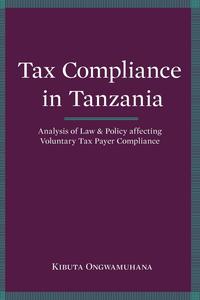This book examines the problems of low-level tax compliance in Tanzania. It proceeds from the premise that high-level taxpayer compliance is essential to the success of the tax system. The author argues convincingly that tax enforcement alone (namely, detection and punishment of tax delinquency), will not of itself lead to high-level tax compliance. He posits that there exists a strong link between good governance and taxpayer compliance; tax compliance levels reflecting effectiveness of tax administration, taxpayer attitudes towards taxation and towards government in general. He argues further that these attitudes are formed in a social context, including factors such as perceived fairness of the tax structure, the ability of government to deliver services to its people and the legitimacy of government. Tax reforms which aim only at reforming the tax administration so as to make it more modern, efficient, and responsive, cannot achieve optimum tax compliance if such tax administration reforms do not go hand in hand with the creation of a caring attitude in the tax institution backed up by a government committed to serving its people. The book focusses primarily on tax compliance in Tanzania, but it also examines relevant data from the neighbouring countries of Kenya, Uganda, Rwanda, and Zambia, which have undergone tax administration reforms similar to Tanzania and are equally concerned with tax compliance, The author does not limit himself to the African continent; numerous examples are taken from, and references make to cases in the US, Canada, UK, Australian and other developed economies since the fundamental issues about tax compliance are essentially the same everywhere. Это и многое другое вы найдете в книге Tax Compliance in Tanzania. Analysis of Law and Policy Affecting Voluntary Taxpayer Compliance (Kibuta Ongwamuhana)
Tax Compliance in Tanzania. Analysis of Law and Policy Affecting Voluntary Taxpayer Compliance Kibuta Ongwamuhana
Подробная информация о книге «Tax Compliance in Tanzania. Analysis of Law and Policy Affecting Voluntary Taxpayer Compliance Kibuta Ongwamuhana». Сайт не предоставляет возможности читать онлайн или скачать бесплатно книгу «Tax Compliance in Tanzania. Analysis of Law and Policy Affecting Voluntary Taxpayer Compliance Kibuta Ongwamuhana»
